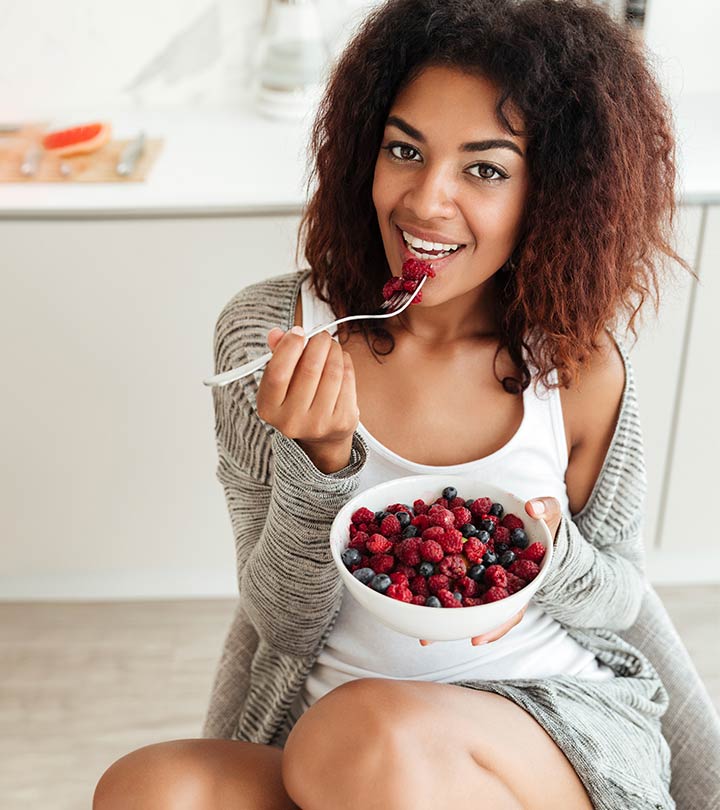Diet Plan for Healthy Skin and Body

Pollution, sun, stress, hormones, and unhealthy food can make your skin dull and prone to acne and pigmentation. And you end up spending a ton of money on skincare and makeup products without any sustainable results. This is precisely why you need to be on a skin-friendly diet and consume fruits, veggies, and healthy fats (1). In this article, we give you the best diet plan for glowing skin and a list of foods to eat and avoid. Incorporate it into your lifestyle to get a healthy and natural glow that will outdo any makeup artist's smart hacks.
Diet Plan For Glowing Skin
| MEALS | WHAT TO EAT |
|---|---|
| Early Morning (6:00 a.m.) | 1 cup lukewarm water + juice of half a lime + 4 overnight soaked almonds Or 1 cup water + aloe vera juice + 4 overnight soaked almonds |
| Breakfast (6:45-7:00 a.m.) | 1 wheat bread + 1 cup ricotta cheese/boiled egg+ 1 cup papaya/pomegranate/any seasonal fruits Or 1 cup rolled oats with milk and fresh fruits + 1 cup green tea |
| Mid Morning (9:30-10:00 a.m.) | 1 cucumber/carrot, sliced with yogurt/hummus Or 1 cup freshly-pressed fruit/vegetable juice (unstrained) / coconut water |
| Lunch (12:30 – 1:00 p.m.) | Lettuce wraps with veggies and chicken/mushroom/tofu + 1 cup buttermilk Or Blanched veggies + grilled fish/chicken/ lentil soup + 1 small cup brown rice/quinoa |
| Snack (3:30 – 4:00 p.m.) | 1 cup green tea + 2-3 walnuts Or 1 cup freshly-pressed fruit/vegetable juice (unstrained) |
| Dinner (7:00-7:30 p.m.) | Vegetable/chicken stew + 1 flat whole-wheat bread + 1 cup raita Or Mixed vegetable curry + 2 flat whole-wheat breads + 1 cup raita |
| Bed Time (10:00 p.m.) | 1 cup warm milk/ water + a pinch of turmeric |
Takeaways From This Diet Chart
You do not have to stick to this diet chart. You can consume healthy foods that will help repair and rejuvenate your skin. And for that, you have to understand what to include in your diet and what to avoid. Given below are a few tips that will help you do so:
- Drinking water on an empty stomach is a must. You may consume aloe vera juice, turmeric powder, or lime juice.
- Always have breakfast before heading out.
- Include good amounts of fruits, veggies, and protein in every meal.
- Stick to healthy snacking by consuming freshly pressed fruit juice, yogurt, buttermilk, or coconut water.
- Consume foods that are good for your gut and liver.
- Avoid foods that you may be allergic to, such as dairy, seafood, and gluten.
- Get creative by seasoning your food with spices and herbs.
- Keep hydrating yourself by including water, buttermilk, coconut water, and fruit and vegetable juices into your daily diet. Water is a natural detoxifier, so try to drink a minimum of 2.5 liters of water a day (amount may vary based on body weight).
Now, let us take a look at the list of foods you must consume and how they help improve your skin health.
15 Foods For Naturally Glowing Skin
1. Water
Drinking lots of water throughout the day will keep your system internally hydrated, which, in turn, directly reflects on your skin (2). Water not only flushes out the harmful toxins from your system but also keeps wrinkles at bay and gives you naturally glowing skin. Keep a bottle of water handy and sip on it whenever you crave for your favorite cola.
2. Dark Green Leafy Vegetables
When it comes to skin health, dark leafy greens take the front seat. They are loaded with antioxidants and essential vitamins and nutrients (3). Dark green leafy vegetables such as spinach, Swiss chard, radish leaves, mustard leaves, lettuce, coriander, parsley, broccoli, and arugula help rid your skin of dullness and enhance its glow. You can add them to salads, soups, sandwiches, wraps, daal, etc.
3. Turmeric
Curcumin is the main phytonutrient responsible for turmeric's antibacterial, antiviral, anti-inflammatory, and antifungal properties. Turmeric taken orally or used for topical application has overall skin benefits, though further research is required to prove the same (4). You can consume washed and peeled raw turmeric first thing in the morning or while going to bed with a glass of milk. You can also add fresh turmeric to curries, salad dressing, juices, etc.
4. Avocado
Avocado is the perfect superfood for the skin. It is rich in vitamin E and healthy fats (5). A cross-sectional study done on Japanese women has revealed that healthy fats – especially saturated and monounsaturated fats – improve skin elasticity (6). This means that avocados may help slow down skin damage, lock in moisture, and prevent premature wrinkling and dullness. Easy ways to include them in your diet is to add them to your breakfast bowl, sandwiches, salads, dipping sauce, etc.
5. Aloe Vera
Aloe vera is the most popular home remedy for all skin problems. It contains the hormones auxin and gibberellin that have anti-inflammatory properties (7). Hence, when you apply aloe vera topically or consume its extract in the form of juice or supplements, it helps reduce any kind of inflammation. A study done on rats has found that it can also boost collagen synthesis and heal dermal wounds (8). However, don't ever consume aloe vera gel directly from a plant.
6. Fruits
Fruits are loaded with vitamins, minerals, and fruit sugar. These sweet treats keep your hunger pangs at bay, preventing you from consuming sugary junk food that increases inflammation in your body. Hence, by consuming fruits, you will be able to maintain your skin's health and get the glow that you always wanted. Here are a few fruits that we recommend:
- Mangoes are rich in antioxidants and beta-carotene (a precursor of vitamin A), which is synthesized in the skin. Oral intake of beta-carotene helps reduce UV-induced redness in humans (9). It also said to prevent premature aging, retain the skin's elasticity, and facilitate the growth of new skin cells, though there is not enough scientific evidence to support these claims.
- Banana is rich in vitamins A, B, and E and prevents premature wrinkling of the skin. It has moisturizing and antioxidant properties (10).
- Papaya has antibacterial properties (11). Thus,it may help in shedding the dead skin cells and clearing your skin of impurities.
- Oranges and kiwis are rich in vitamin C (12), (13). Vitamin C delays the onset of wrinkles and boosts collagen synthesis (14) Kiwi is also a powerful antioxidant (15). Other vitamin C-rich fruits are guavas, grapefruits, and strawberries. Vitamin C also protects the skin from sun damage and promotes cell turnover, thus preserving the youth and beauty of your skin (14).
- Anecdotal evidence suggests that a glass of warm water with honey and lemon juice can lighten your skin tone and keep it clear.
- Apple helps maintain a toned look and makes your skin look younger, though there is no scientific evidence to prove the same.
- Berries have potent antioxidant properties (16). Anecdotal evidence suggests that consuming them may help you get rid of dark spots and marks quickly.
7. Carrot
Carrots contain high levels of beta-carotene, vitamin A, and antioxidants. They make your skin healthy from the inside by flushing out toxins. They also have a photoprotective effect. They protect your skin from sun-induced damage and prevent premature aging and wrinkles (17). Sweet potatoes and yams are other options that show similar results.
8. Fish And Fish Oil
Fish and fish oil are rich in omega-3 fatty acids. They provide the skin with a healthy dose of natural oils (good fats) to reduce inflammation, acne, and redness (18). Consume fatty fish like tuna, salmon, and carp or take fish oil supplements to keep your skin healthy and soft. Consume grilled or baked fish. Do not discard the skin.
9. Healthy Fats
Healthy fats are great for your skin. The main sources of healthy fats (omega-6 fatty acids) are nuts (almond, walnut, macadamia, etc.), seeds (flaxseed, sunflower seed, chia seed, etc.), healthy oils (olive oil, rice bran oil, etc.), and fish and fish oil, which we have already talked about. Nuts, seeds, and oils are great options for vegans and vegetarians to nourish their skin, improve its structure, and heal wounds (19). Include them in your diet in adequate amounts to get flawless skin.
10. Green Tea/Matcha Tea
Green tea is a natural source of antioxidants. It is loaded with a potent phytonutrient – epigallocatechin gallate (EGCG). The percent of EGCG is highest in matcha tea and green tea. These antioxidants in tea help scavenge the harmful free radicals, thereby protecting your skin from premature aging, dark spots, and redness (20). Green tea polyphenols also prevent acne vulgaris and lipid synthesis by the sebaceous glands, leaving your skin healthy and blemish-free (21).
11. Broccoli
Broccoli is a rich source of antioxidants (22). Antioxidants play an important role when it comes to enhancing skin health. The free oxygen radicals attack the cells and disrupt the normal functioning of the cells and organs. This, in turn, can cause hormonal imbalance, weak immunity, gut problems, etc. So, you need a good dose of antioxidants from food, specifically broccoli, as it gives you quicker results compared to other cruciferous veggies.
12. Yogurt
Yogurt and buttermilk contain probiotics that help in digestion, absorption, and excretion (23). When your digestion is smooth, and you have no gut problems, your skin will be less prone to breakouts, dryness, and infections. Consume yogurt every day after lunch, dinner, and in shakes and smoothies.
13. Bottle Gourd
It hydrates and protects your skin, thereby giving it a natural glow. The phytonutrients present in bottle gourd have anti-inflammatory and antioxidant properties (24). Therefore, it may help in getting rid of scars naturally. Bottle gourd juice also improves digestion and reduces constipation (25). Thus, it may lend your skin a natural glow. Consume bottle gourd juice in the morning with other breakfast items. You can also make bottle gourd soup or add it to stews and daals.
14. Bitter Melon
It tastes bitter but is an amazing natural remedy for skin problems like redness, allergies, scars, and tanning. A study conducted on liver-injured rats has found that, apart from being a good source of antioxidants and have anti-inflammatory properties, bitter melon also keeps your liver and gut-healthy (26). Consume boiled bitter melon or add it to stews. Do not fry or soak it in water for a long duration as it reduces its nutritional value.
15. Red Wine
Red wine is nothing but fermented red grape juice. It has the ability to retain the skin's original glow and prevent aging. The polyphenols present in it protect the skin from inflammation and sun damage (27). However, consume it in limited quantities as excess alcohol causes dehydration, which might aggravate your skin problems.
These are the foods you need to consume to keep your skin healthy. But which foods do you need to avoid? Here's the list.
Foods To Avoid
- Spicy foods
- Processed and junk foods
- High-sodium and high-sugar foods
- Oily and unhygienic foods
- Foods containing high levels of estrogen
- Foods that increase the internal body temperature
- Overcooked or partially charred foods (kebabs)
Conclusion
Healthy and glowing skin is a sign of good health. And you should consume healthy food and follow a diet plan for glowing skin to achieve it. Toss out all bad food habits and start following a new lifestyle. Cheers!
Sources
Articles on StyleCraze are backed by verified information from peer-reviewed and academic research papers, reputed organizations, research institutions, and medical associations to ensure accuracy and relevance. Check out our editorial policy for further details.
- Nutrition and Skin, Reviews in Endocrine and Metabolic Disorders, U.S. National Library of Medicine, National Institutes of Health.
https://www.ncbi.nlm.nih.gov/pubmed/27401878 - Dietary water affects human skin hydration and biomechanics, Clinical, cosmetic and investigational dermatology, U.S. National Library of Medicine, National Institutes of Health.
https://www.ncbi.nlm.nih.gov/pmc/articles/PMC4529263/ - Health Benefits of Fruits and Vegetables, Advances in Nutrition, An International Review Journal, U.S. National Library of Medicine, National Institutes of Health.
https://www.ncbi.nlm.nih.gov/pmc/articles/PMC3649719/ - Effects of Turmeric (Curcuma longa) on Skin Health: A Systematic Review of the Clinical Evidence, Phytotherapy Research, U.S. National Library of Medicine, National Institutes of Health.
https://www.ncbi.nlm.nih.gov/pubmed/27213821 - Nutritive Value of Avocados, raw, all commercial varieties, U.S. Department of Agriculture.
https://fdc.nal.usda.gov/fdc-app.html#/food-details/171705/nutrients - Association of dietary fat, vegetables and antioxidant micronutrients with skin ageing in Japanese women, The British Journal of Nutrition, U.S. National Library of Medicine, National Institutes of Health.
https://www.ncbi.nlm.nih.gov/pubmed/20085665 - Aloe Vera: A Short Review, Indian Journal of Dermatology, U.S. National Library of Medicine, National Institutes of Health.
https://www.ncbi.nlm.nih.gov/pmc/articles/PMC2763764/ - Influence of Aloe vera on collagen characteristics in healing dermal wounds in rats, Molecular and Cellular Biochemistry, U.S. National Library of Medicine, National Institutes of Health.
https://www.ncbi.nlm.nih.gov/pubmed/9562243/ - Supplementation with beta-carotene or a similar amount of mixed carotenoids protects humans from UV-induced erythema, The Journal of Nutrition, U.S. National Library of Medicine, National Institutes of Health.
https://www.ncbi.nlm.nih.gov/pubmed/12514275/ - Antioxidant activity and protective effect of banana peel against oxidative hemolysis of human erythrocyte at different stages of ripening, Applied Biochemistry and Biotechnology, U.S. National Library of Medicine, National Institutes of Health.
https://www.ncbi.nlm.nih.gov/pubmed/21369778 - Antibacterial effects of Carica papaya fruit on common wound organisms, The West Indian Medical Journal, U.S. National Library of Medicine, National Institutes of Health.
https://www.ncbi.nlm.nih.gov/pubmed/15040064 - Nutritive Value of Oranges, raw, navels, U.S. Department of Agriculture.
https://fdc.nal.usda.gov/fdc-app.html#/food-details/169917/nutrients - Nutritive Value of kiwifruit, green, raw, U.S. Department of Agriculture.
https://fdc.nal.usda.gov/fdc-app.html#/food-details/327046/nutrients - The Roles of Vitamin C in Skin Health, Nutrients, U.S. National Library of Medicine, National Institutes of Health.
https://www.ncbi.nlm.nih.gov/pmc/articles/PMC5579659/ - Kiwifruit protects against oxidative DNA damage in human cells and in vitro, Nutrition and Cancer, U.S. National Library of Medicine, National Institutes of Health.
https://www.ncbi.nlm.nih.gov/pubmed/11588897 - Bioactive Compounds and Antioxidant Activity in Different Types of Berries, International Journal of Molecular Sciences, U.S. National Library of Medicine, National Institutes of Health.
https://www.ncbi.nlm.nih.gov/pubmed/26501271 - The Role of Phytonutrients in Skin Health, Nutrients, U.S. National Library of Medicine, National Institutes of Health.
https://www.ncbi.nlm.nih.gov/pmc/articles/PMC3257702/ - Omega-3 fatty acids: An update emphasizing clinical use, Agro food industry hi-tech, U.S. National Library of Medicine, National Institutes of Health.
https://www.ncbi.nlm.nih.gov/pmc/articles/PMC3890980/ - Wound Healing and Omega-6 Fatty Acids: From Inflammation to Repair, Mediators of Inflammation, U.S. National Library of Medicine, National Institutes of Health.
https://www.ncbi.nlm.nih.gov/pmc/articles/PMC5925018/ - Green tea polyphenols provide photoprotection, increase microcirculation, and modulate skin properties of women, The Journal of Nutrition, U.S. National Library of Medicine, National Institutes of Health.
https://www.ncbi.nlm.nih.gov/pubmed/21525260 - Green Tea and Other Tea Polyphenols: Effects on Sebum Production and Acne Vulgaris, Antioxidants, U.S. National Library of Medicine, National Institutes of Health.
https://www.ncbi.nlm.nih.gov/pmc/articles/PMC5384166/ - Potential health benefits of broccoli- a chemico-biological overview, Mini Reviews in Medicinal Chemistry, U.S. National Library of Medicine, National Institutes of Health.
https://www.ncbi.nlm.nih.gov/pubmed/19519500 - Should yoghurt cultures be considered probiotic? The British Journal of Nutrition, U.S. National Library of Medicine, National Institutes of Health.
https://www.ncbi.nlm.nih.gov/pubmed/16022746 - Phytochemical and pharmacological review ofLagenaria sicereria, Journal of Ayurveda and Integrative Medicine, U.S. National Library of Medicine, National Institutes of Health.
https://www.ncbi.nlm.nih.gov/pmc/articles/PMC3117318/ - The Therapeutic Potential of Medicinal Foods, Advances in Pharmacological and Pharmaceutical Sciences, Hindawi.
https://www.hindawi.com/journals/aps/2014/354264/ - Protective effect ofMomordica charantia water extract against liver injury in restraint-stressed mice and the underlying mechanism, Food and Nutrition Research, U.S. National Library of Medicine, National Institutes of Health.
https://www.ncbi.nlm.nih.gov/pmc/articles/PMC5510204/ - Skin photoprotection by natural polyphenols: anti-inflammatory, antioxidant and DNA repair mechanisms, Archives of Dermatogical Research, U.S. National Library of Medicine, National Institutes of Health.
https://www.ncbi.nlm.nih.gov/pubmed/19898857/
Recommended Articles
- 22 Home Remedies To Get Glowing Skin
- 25 Best Foods For Healthy Skin
- Olay Natural White Day Glowing Fairness Cream Review
- Top 20 Fruits For Good Healthy Glowing Skin
Was this article helpful?
The following two tabs change content below.
- Author
- Reviewer

Jyotsana Rao is an engineering graduate from NIT, Nagpur, who discovered her love for writing during her undergraduate days. She... more

Temple Stewart is a Registered Dietitian Nutritionist and Personal Trainer in St. Petersburg, FL. She sees clients all over the... more
Diet Plan for Healthy Skin and Body
Source: https://www.stylecraze.com/articles/best-diet-for-glowing-skin/